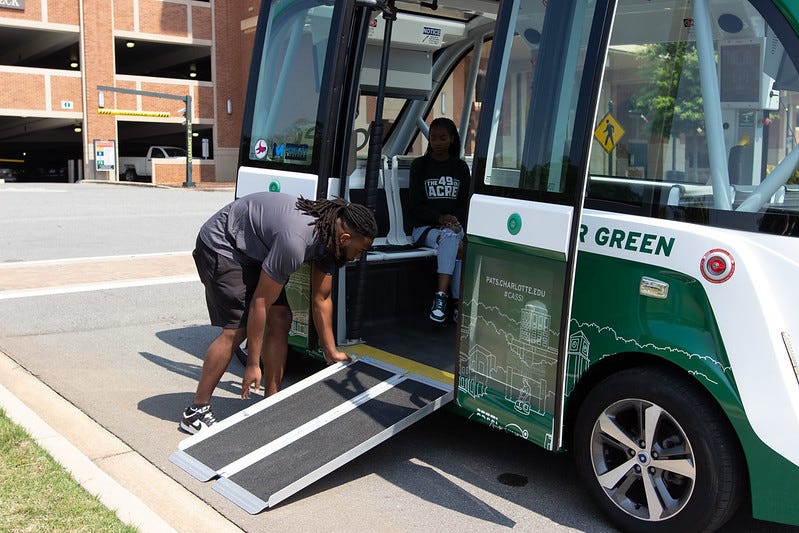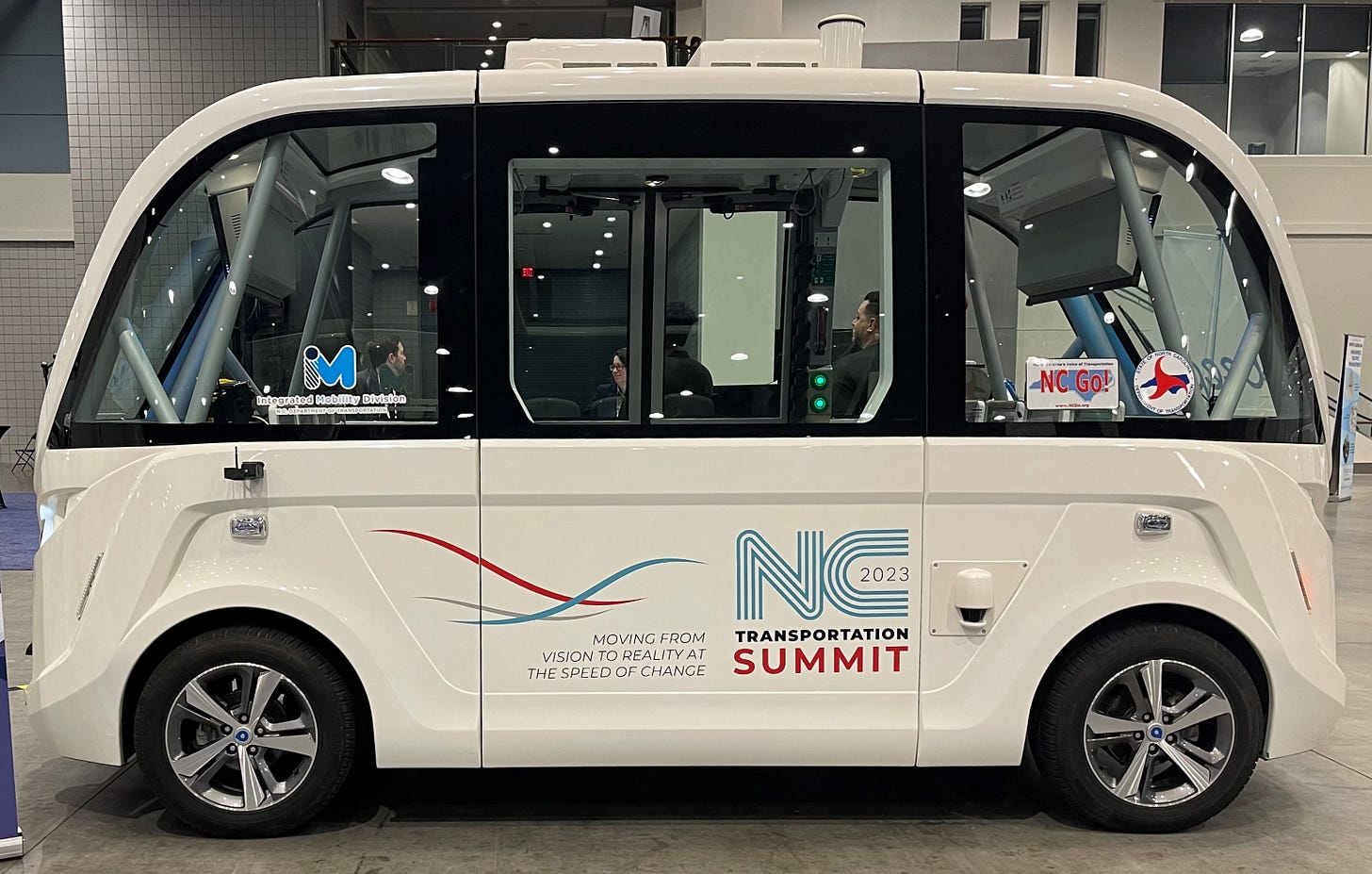UNC Charlotte is testing a self-driving shuttle
Meet CASSI, who is pitching in on the 'Greek Village route' for 6 months
You’re reading Transit Time, a weekly newsletter for Charlotte people who leave the house. Cars, buses, light rail, bikes, scooters … if you use it to get around the city, we write about it. Transit Time is produced in partnership between The Charlotte Ledger and WFAE.
The autonomous 8-passenger shuttle is expected to ‘turn heads’ when passengers begin riding in July; ‘It looks like a toaster on wheels’
CASSI, a self-driving shuttle, is expected to start carrying passengers at UNC Charlotte in July. (Photo courtesy of UNC Charlotte)
by Tony Mecia
She’s a little slow. Her debut has been hush-hush. But she’s almost ready for her most complex challenge yet.
CASSI, a self-driving shuttle, started making the rounds this week on a 2.2-mile route at UNC Charlotte. She’s the centerpiece of a six-month experiment on autonomous vehicles by the N.C. Department of Transportation — the first such project in Charlotte.
Technicians are testing her this week and next week with no passengers, ahead of a July 5 start. NCDOT has tested CASSI before, at a park in Cary and at a museum on the Outer Banks.
But at UNC Charlotte, her mission is the most complicated yet: She’ll have to navigate four traffic lights while steering clear of pedestrians, bikes, cars, scooters, fellow shuttles and other realities of campus life.
“There are a lot of nuances to our pilot project that make it the most challenging they have done to date,” says Doug Lape, UNC Charlotte’s associate vice chancellor for business services. “That’s always been the plan — to ramp up and fine tune all of that, with the overall goal of figuring out where this technology fits, and where it might fit in the future.”
The experiment at UNC Charlotte comes as technology continues to progress on autonomous vehicles — while still largely falling short of the sci-fi vision of vehicles with computers fully behind the wheel. Many cars on the market now have driver-assistance capabilities that can help with steering, braking or parking in certain circumstances, under driver supervision.
Self-driving vehicles have the potential to be safer and more convenient than human-driven vehicles. But there are still questions about costs and regulations — and whether consumers are ready. A Washington Post investigation this month found that Tesla’s “Autopilot” feature has been linked to 11 fatal crashes since May 2022, fueling worries that self-driving vehicles aren’t ready for prime-time.
At UNC Charlotte, CASSI — which stands for “Connected Autonomous Shuttle Supporting Innovation” — will be self-driving but will have an operator on board ready to take control if needed.
She’s painted 49er green, is fully electric, has seating for 8 passengers and goes a maximum of 12 mph.
“She’s a little slow, but that’s meant to be that way to make sure it can react,” Lape says. “We don’t have any concerns about the vehicle being able to stop if something happens. But if it has to stop, it absolutely just stops.”
An earlier version of CASSI, seen earlier this year at a transportation summit in Raleigh. She’s manufactured by France-based Navya and operated by Florida-based Beep. (Photo courtesy of N.C. Department of Transportation)
The details: CASSI will supplement normal driver-operated shuttles on the Niner Transit bus service’s “Greek Village route,” which has six stops including the campus’ student union and a residential complex that contains the university’s sorority houses. Through December, she’ll run weekdays from 8:30 a.m. to 4:30 p.m., with a couple hours off in the middle of the day to recharge her batteries. Passengers can ride for free.
The look: As far as what she looks like, Lape says: “Someone described it to me as, ‘It looks like a toaster on wheels.’ I go, ‘That’s fair.’”
The tech: CASSI uses a technology called LiDAR that uses lasers to detect distances and is also equipped with cameras and GPS. She can also communicate with the traffic signals to anticipate when a light is about to change.
The test project at UNC Charlotte follows several other high-tech initiatives on campus, including construction of a checkout-free market in the student union and food-delivery robots. The food-delivery robots — there will be 70 of them on campus this fall — have proven so popular that there’s even a fan page for them on Instagram:
CASSI might get her own Instagram page, too.
“It’s an attractive vehicle,” Lape says. “It will definitely turn heads.”
Tony Mecia is The Ledger’s executive editor. Reach him at tony@cltledger.com
Transportation leaders to share insights at third-annual South Charlotte Partners Regional Transportation Summit
Transit Time is pleased to announce we’ve signed on as a media partner to an annual transportation summit that brings together local, state and federal policymakers to discuss transportation and mobility issues.
Our Transit Time team attended last year and anchored a panel. The summit is a great place to learn about the latest in Charlotte-area transit and transportation from decision-makers. (Last year’s event drew more than 350 people … and led to several of our insightful articles about emerging trends.)
This year’s day-long South Charlotte Partners Regional Transportation Summit will be Sept. 11 from 8 a.m. to 3 p.m. at The Ballantyne hotel and will feature an all-star lineup of confirmed speakers including:
N.C. Secretary of Transportation Eric Boyette
Charlotte Mayor Vi Lyles
Charlotte City Council member and transportation committee chair Ed Driggs
NCDOT’s Division 10’s Brett Canipe
NCDOT board member Tony Lathrop
CLT Airport’s Stuart Hair
American Airlines’ Tracy Montross
Gresham Smith aviation design expert Ben Goebel
CATS’ Jason Lawrence
Sponsors currently include: Silver: Novant; Bronze: Froehling & Robertson, Gresham Smith, HNTB, LaBella Architects and Towne Bank; Media Partner: The Charlotte Ledger
Individual tickets for the summit are $100 and can be purchased here:
➡️ For more information, visit southcharlottepartners.com or follow SCP on social on Facebook, Instagram, or LinkedIn.
When you support WFAE, you support this Transit Time newsletter
This Transit Time newsletter is a joint production of The Charlotte Ledger and WFAE.
We make it free to all — but it is not free to produce.
You’re able to read local transit and transportation insights by WFAE’s Ely Portillo and Steve Harrison here because WFAE pays their salaries to dig into those issues and allows them to share that knowledge with you.
WFAE is holding one of its regular pledge drives this week. The money they raise funds local journalism, including Transit Time.
If you’d like to support that effort, you can do that here:
In brief…
Towns say Charlotte has too much transportation power: Huntersville and Cornelius have voted to support reorganizing how a regional transportation panel makes decisions. The towns say Charlotte, which controls 46% of the votes, has too much power. The move could have big implications for projects like proposed toll lanes on Interstate 77 in south Charlotte, as well as Charlotte’s efforts to build a regional transit system. (WFAE)
Charges unlikely for bus driver involved in shootout: Police don’t anticipate filing charges against a Charlotte Area Transit System bus driver involved with a shootout with a passenger last month. Video shows the driver and passenger exchanging gunfire after an argument. The driver was fired, and the passenger was charged with assault with a deadly weapon. (WBTV)
West End interchange study: A $1 million federal grant to study the I-77 interchanges near Wesley Heights could help bring minority-owned businesses, mixed-income housing and parks to the historically Black area. Ideas include adding a pedestrian bridge, a promenade, a linear urban park and a street lined with shops and restaurants. (Axios Charlotte)
Traffic worries in Plaza-Midwood: Residents in Plaza-Midwood say the neighborhood’s roads and transit options aren’t keeping pace with the area’s growth. One resident said: “With everyone driving passenger cars, it’s just difficult. It’s just so congested all the time. Everywhere.” (WCNC)
Transit Time is a production of The Charlotte Ledger and WFAE. You can adjust your newsletter preferences on the ‘My Account’ page.
Did somebody forward you this newsletter and you need to sign up? You can do that here:
Other affiliated Charlotte newsletters and podcasts that might interest you:
The Charlotte Ledger Business Newsletter, Ways of Life newsletter (obituaries) and Fútbol Friday (Charlotte FC), available from The Charlotte Ledger.
The Inside Politics newsletter, available from WFAE.








